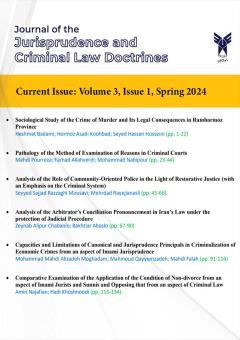Execution of Civil Verdicts of Spiritual Damages in Iran and England Law
Subject Areas : Jurisprudence and Criminal Law DoctrinesAlireza Haraj 1 , Abasat Pourmohammad 2 *
1 - PhD student in private law, Maragheh Branch, Islamic Azad University, Maragheh, Iran
2 - Assistant Professor, Department of Law, Maragheh Branch, Islamic Azad University, Maragheh, Iran.
Keywords: spiritual compensation, enforcement verdicts of spiritual compensation, spiritual compensation in England Law,
Abstract :
Any damage caused to individuals, should be compensated by the person causing the damage. In addition to material and loss of life damages, there have also been spiritual damages and the legal system of Iran faces many challenges in execution of verdicts of compensation. This research was conducted in an analytical descriptive method and its purpose is to survey and compare the issue of spiritual damages in the two legal systems of Iran and England. The conclusion of research concluded that in England, spiritual damages are linked with material damages and are included for the first-degree relatives of victim. Forensic psychologists determine the severity of spiritual damages and then the judge determines the amount of damage and orders its payment. At the same time, the cost of treatment is objectively compensated, although this type of compensation can only be implemented for a genuine person. In Iran, there is no precise mechanism for determining spiritual damages and usually, the amount of damage is determined while referring to the judicial procedure and Arash, that is determined according to the report of experts, which usually does not explain the justice-oriented principles, therefore, judges mainly try to reach a compromise between the parties. Attention to this fact, revealed the necessity and requirement of complete and accurate determination of rules of this field. The compensation verdict of spiritual damage is sentenced according to criterions of execution judge in determination of accurate amount of damage, which has limited authorities that are not obvious in England Law.
1. بادینی، حسن، (1395)، فلسفه مسئولیت مدنی، تهران، شرکت سهامی انتشار.
2. باریکلو، علیرضا، (1385)، مسئولیت مدنی، تهران، بنیاد حقوقی میزان.
3. توانگر، زهرا؛ فروغی، فضل الله، (1395)، بررسی حکم تداخل دیه منافع در جنایت بر اعضاء، مجله مطالعات حقوقی دانشگاه شیراز، شماره:8 (2)، ص183-213.
4. توجهی، عبدالعلی؛ ابراهیم وند، حسام، (1396)، کیفرگذاری و کیفردهی در حوزه سلب آزادی در حقوق ایران و انگلستان، دیدگاه¬های حقوق قضائی، شماره: 1 (77)، ص41-90.
5. رحیمی، نرجس خاتون، (1391)، جنایت بر منافع اعضای بدن در فقه امامیه و حقوق ایران، دانشگاه فردوسی مشهد، پایان نامه کارشناسی ارشد.
6. زراعت، عباس، (1397)، شرح مبسوط قانون مجازات اسلامی بخش قصاص، تهران، انتشارات جنگل جاودانه.
7. فرح زادی، علی اکبر؛ فهیم، نرگس، (1395)، تداخل اسباب دیه در فقه امامیه، مطالعات فقه و حقوق اسلامی، شماره: 8 (14)، ص195-214.
8. فیض، علیرضا، (1372)، منافع بشری و جنایت بر آن، تهران، انتشارات وزرات فرهنگ و ارشاد اسلامی.
9. قاسم زاده، سید مرتضی، (1398)، مبانی مسئولیت مدنی، تهران، نشر میزان.
10. محقق داماد، سید مصطفی، (1390)، جنایت بر اعضای بدن از دیدگاه فقه و حقوق اسلامی، فصلنامه فقه پزشکی، شماره: 2 (5)، ص11-35.
11. نعمتی، حسن، (1395)، بررسی تطبیقی دیه اعضاء در مذاهب اسلامی، دانشگاه آزاد اسلامی، واحد تهران مرکز، پایان نامه کارشناسی ارشد.
12. Bell, J; Boyron, S & Whittaker, S, (2008), Principles of French law, oxford university Press.
13. Bermann, G, A & Picard, E (Eds), (2008), Introduction to French law, Kluwer Law International BV.
14. Bueno, N & Bright, C, (2020), Implementing Human Rights Due Diligence Through Corporate Civil Liability. International & Comparative Law Quarterly, 69(4), 789-818.
15. Cartwright, J & Hesselink, M, (Eds), (2008), Precontractual liability in European private law, Cambridge University Press.
16. Cossart, S ; Chaplier, J & De Lomenie, T. B, (2017), The French law on duty of care: A historic step towards making globalization work for all, Business and Human Rights Journal, 2(2), 317-323.
17. Elliott, C, (2001), French criminal law, Routledge.
18. Ghaisary, S, A, Yousefzadeh, M & Habib, M, (2020), Preventive civil liability and its educational principles in the high school social studies textbook, Revista Conrado, 16(76), 68-78.

